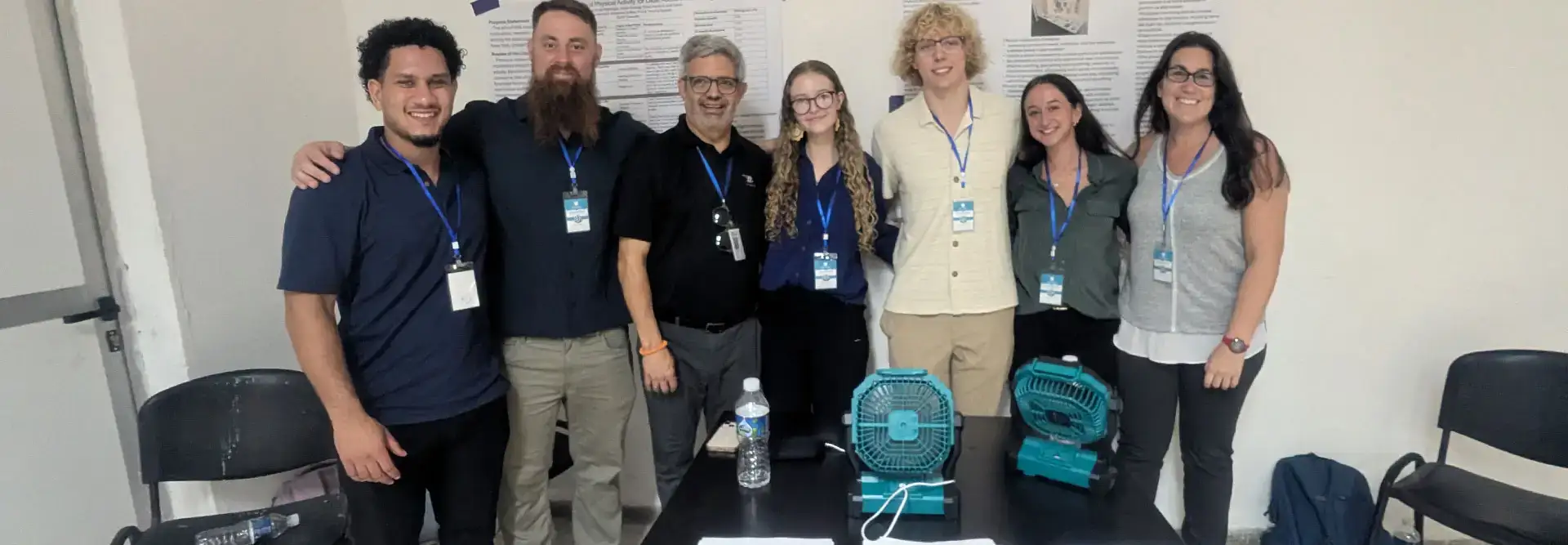A team of SUNY Oneonta faculty, staff and students traveled to Cuba from Oct. 23 to Nov. 1 to present research at the Cuba TIES (Strategic Alliances for the Internationalization of Higher Education) conference, an international event dedicated to collaboration and innovation in higher education.
This marks the first time a SUNY Oneonta group has participated in the conference, joining others from U.S. institutions, including SUNY Cortland, Cal State LA and Laman College in the Bronx, along with faculty from Spain, Cuba and South Africa.
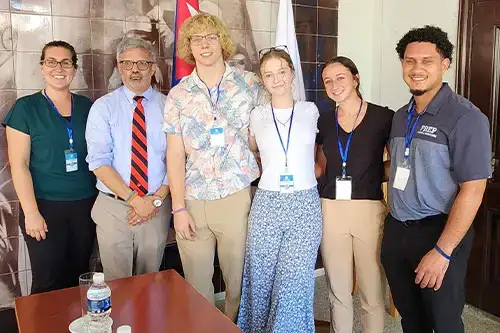
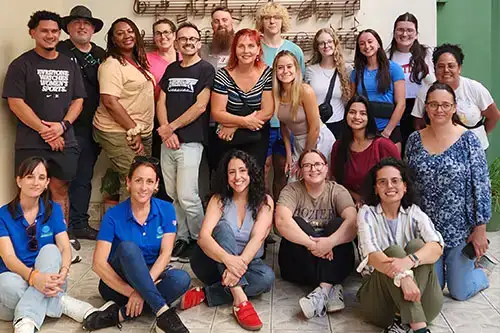
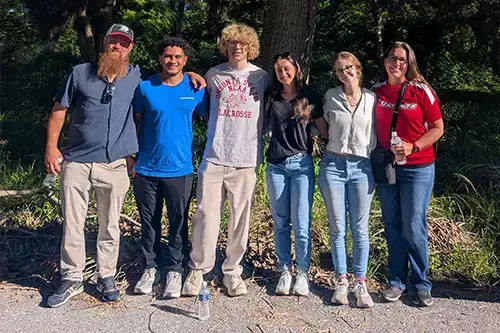
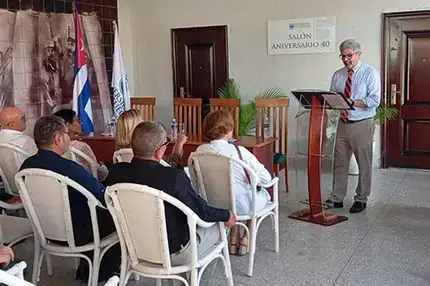
Created in collaboration between the University of Cienfuegos and Civitas Global Education Services (GES) in 2014, the Cuba TIES Conference brings together educators and researchers from around the world to explore new ways of working together across disciplines and borders. The event, in its 10th iteration, highlights the value of shared knowledge and global cooperation in fostering stronger educational systems for students. Hosted at the University of Cienfuegos, “Cuba TIES 10” took place from Oct. 28-31 and was under the umbrella of the third International Scientific Convention of Cienfuegos.
"We are convinced that the international association of students, professors and universities, through working relationships, will increase the sense of belonging of each individual, and therefore improve the work in the classrooms and produce better citizens for their societies,” said SUNY Oneonta President Alberto Cardelle, who attended the International Scientific Convention of Cienfuegos as the keynote speaker.
At the convention, Dr. Orquídea Urquiola Sánchez, the Rector of the University of Cienfuegos, presented Cardelle with an award for “the close and fruitful ties of collaboration” he maintains with the University of Cienfuegos.
Global education should not only be about agreements and partnerships, but also about fostering collaborative spaces for new knowledge, expanding the range of students and teachers...
"Global education should not only be about agreements and partnerships, but also about fostering collaborative spaces for new knowledge, expanding the range of students and teachers, and ensuring that these students then become disseminators of their principles and change their societies," Cardelle said.
Presenting at Cuba TIES 10
SUNY Oneonta’s delegation included Assistant Professor of Sport and Exercise Science Katherine Griffes and Men’s Soccer and Men’s and Women’s Tennis Assistant Coach Timothy Sagasti, along with alum Albert Vargas (‘25), Emily McDougall, an Exercise Science major (’27), Wyatt Martin, a Biology major (’27) and Jaiden Schrag, an Exercise Science major (’28). Additionally, Jack Dyson, an Exercise Science major graduating in December 2025, played a crucial role in conducting the research for the project, which focused on understanding barriers and motivators related to physical activity among older adults in rural regions.
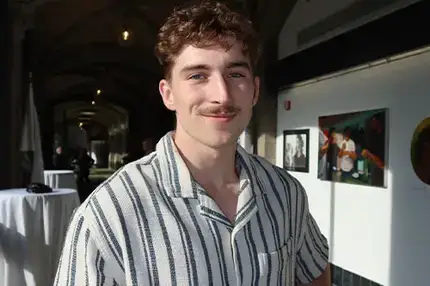
Everyone should exercise for longevity and for a better quality of life. If anything, older adults should be just as active as any other adult.
“It is important to cater to a broader audience when it comes to physical activity,” said Dyson. “Everyone should exercise for longevity and for a better quality of life. If anything, older adults should be just as active as any other adult. I believe that everyone should have people looking out for them, and this research was certainly an opportunity to do so.”
Dyson, Vargas and McDougall presented a project titled “Needs Assessment of Health and Physical Activity Programs for Older Adults in Rural Areas” during the spring 2025 Student Research and Creative Activity (SRCA) showcase on campus, which led to the Cuba TIES presentations. Their research began in fall 2023 through the SRCA program, with data collection continuing into summer and early fall 2024 at community sites, including the YMCA and The Gathering Place.
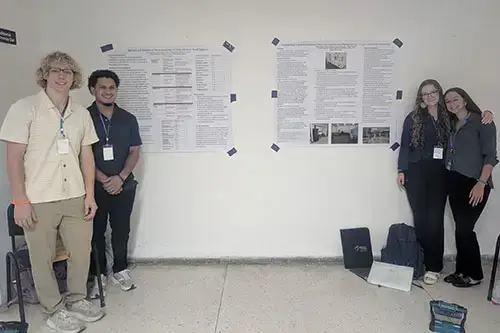
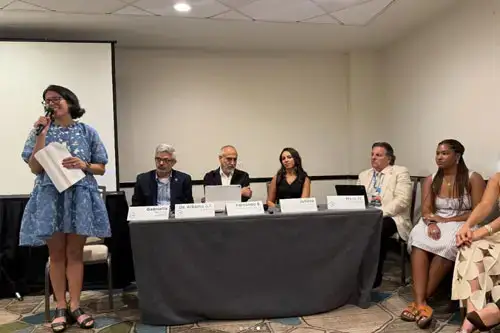
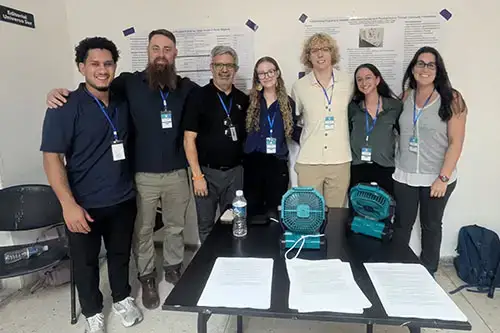
Findings from this project formed the basis of two poster presentations: one examining motivators and barriers to physical activity for older adults, and another offering community recommendations for improving accessibility, engagement and socialization in exercise programs. The team, now including Martin and Schrag, plans to continue its work through the SRCA program next summer to implement several of those recommendations locally.
“I was definitely nervous at first, but presenting at an international conference was such a rewarding experience,” said Schrag, who is also on SUNY Oneonta’s Track and Field Team. “Being able to answer their questions and share our work showed me what impact our research can have beyond our own institution.”
Experiential Learning Through Cultural Immersion
The conference experience combined academic presentation with cultural immersion. During the first portion of the trip before the conference, participants spent time at the University of Matanzas, learning about Cuban history, religion, music and dance through lectures and community engagement activities. Students stayed with host families, taking part in daily routines and meals while exploring local neighborhoods and cultural landmarks. This immersive format gave them a deeper understanding of Cuban life and fostered personal growth through independence, adaptability and collaboration.
The atmosphere of the space was so cheerful and joyous–it was contagious.
“Getting to see the passing of culture and tradition in music to a new generation was an awesome experience. The atmosphere of the space was so cheerful and joyous–it was contagious,” said Martin, who also competes on the Men’s Lacrosse team. “Getting to be involved in the true day-to-day lives of the Cuban people was a very cool experience that helped give me more perspective on life.”
Cultural and logistical differences, such as rolling blackouts and limited cell service, added to the challenge but also enhanced the learning experience. The students were encouraged to navigate these situations independently, reinforcing the value of experiential learning beyond the classroom.
Beyond the academic outcomes, the experience broadened participants’ perspectives on international collaboration and cultural understanding. The trip offered an authentic glimpse into daily life in Cuba and showcased the power of community, compassion and cooperation.
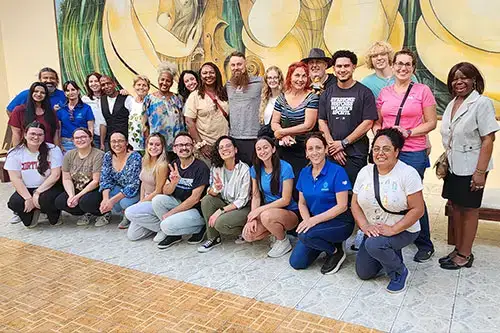
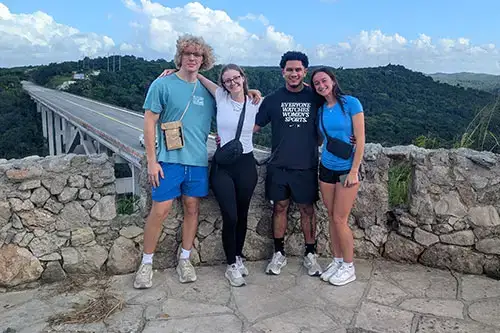
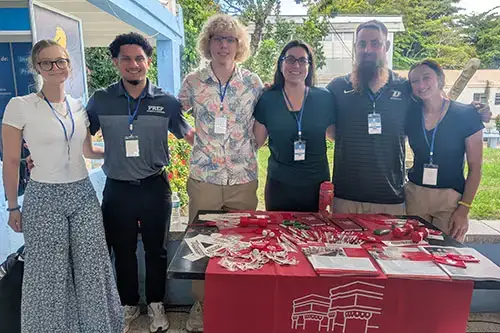
“Seeing how people go about their day gave me a perspective that you really can't understand without experiencing it firsthand,” said Schrag. “I really enjoyed seeing the classic cars and visiting the historical buildings.”
The trip and research were supported by multiple funding sources, including the Student Grant Program for Research and Creative Activity, the Student Travel for Excellence (STEP) Academic Fund, the SUNY Oneonta Athletics Department and the Caroline ’67 and David D’Antonio Student Travel for Excellence Fund.
